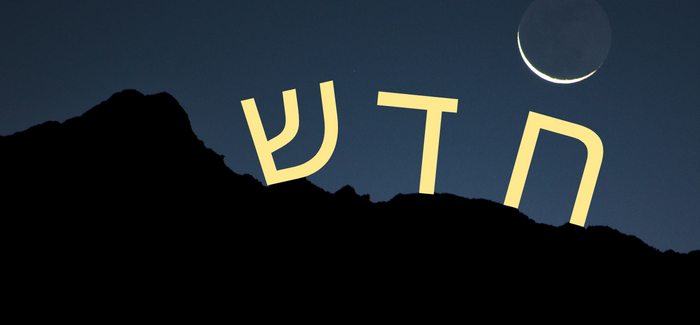About Hebrew
So, What Else Is New?
There are two types of people in this world: Those who divide the world into opposites—e.g., new and old—and those who don’t. Take the example of the Hebrew root ח-ד-ש (het-dalet-shin), “to be new.” This very old root traveled many linguistic roads before settling into modern Hebrew. For example, the ancient city of Carthage was given the Phoenician name Qart-hadasht, which means “New City,” at its founding. In Islam, Hadith, designating a form of sacred Muhammadan literature second only to the Koran, is also derived from the same root, where the Arabic “th” sound is equivalent to the Hebrew “sh” (see hadish, below).
Jewish scripture refers to the root hundreds of times with the word חָדָשׁ (hodesh), month. For example, רֹאשׁ חֹדֶשׁ (rosh hodesh), the new moon, is celebrated with animal sacrifices. But Isaiah I:14 gives a nuance to the root, asserting that חָדְשֵׁיכֶם (hodshekhem), “your sacrifices,” are offered merely to assuage a guilty conscience. A single biblical verse—וַיָּקָם מֶלֶךְ חָדָשׁ (va-yakom melekh hadash), “A new [Egyptian] king has arisen”—foreshadows an era of oppression for the Israelites. At a later time, Deborah’s song in the Book of Judges, celebrating military victory, uses our root in the enigmatic expression אֱלֹהִים חֲדָשִׁים (elohim haddashim), literally, “new gods,” but the verse is probably referring to “new leaders.” Lamentations 5:21 provides us with a beautiful prayer for national renewal based in tradition, חָדָשׁ יָמֵינוּ כְּקֶדֶם (hadesh yameinu ke-kedem), “Renew our days as of old.” And then there is Ecclesiastes, for whom אֵין כָּל חֹדֶשׁ תַּחַת הַשֶּׁמֶשׁ (ein kol hadash tahat ha-shamesh), “There is nothing new under the sun.”
The rabbis of the Mishnah, seeking to apply biblical agricultural law to their times, also give the root a new meaning. In Orlah 3:9, the word חָדָשׁ (hadash) becomes a noun referring to “newly harvested produce.” Some Jewish fundamentalists who reject חַדְשָׁנוּת (hadshanut), modernization, prohibit not only new produce but any religious innovation, הֶחָדָשׁ (he-hadash), literally, the new itself.
Today, we may want to start a discussion מֵחָדָשׁ (me-hadash), with a clean slate. Modern Hebrew offers the perfect conversation starter—מֶה חָדָשׁ (mah hadash), “What’s new?” Answers to that question can found in a broadcast of חַדְשׁוֹת הַיּוֹם (hadashot ha-yom), news of the day, which may feature a חַדְשָׁן (hadshan), innovator, or introduce the latest חָדִישׁ (hadish), up-to-date, Hebrew word derived from our root.
And, when an עוֹלָה חֲדָשָׁה (olah haddashah), a newcomer settling in Israel, shows up, stylishly coiffed, sporting a fashionable outfit and driving a brand new car, it’s surely the right moment to voice a multifaceted תִּתְחַדְּשִׁי (tit-hadshi), “May you be renewed.”
Joseph Lowin’s columns for Hadassah Magazine are collected in the books HebrewSpeak, Hebrew Talk and the recently published Hebrew Matters.











 Facebook
Facebook Instagram
Instagram Twitter
Twitter
Esther Braun says
I usually get the magazine sent to my NY address. Since I’ll be in Florida till May, please send the magazine to my Florida address: 12752 Coral Lakes Dr.
Boynton Beach, FL, 33437
Arielle Kaplan says
Hi Esther, please email membership@hadassah.org with the address change. Thanks!